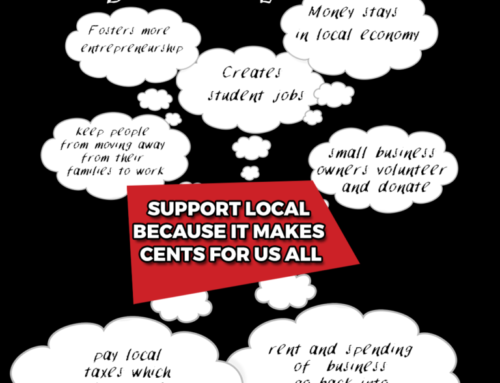We are Taking Action on Climate Change
The last two years have been hard and like most I just want things to go back to normal. I do not believe we have that luxury because we need to adapt to our rapidly changing circumstances. In addition to the health emergency that we have all faced together, the climate crisis also hangs over us. I have been gripped by the emergency and the feeling that we all must be part of the solution. Experts around the world and now even our politicians are walking in lockstep trying to find ways to avert cataclysmic and irreversible damage. Parts of our planet are dying and we are the cause.
We all feel so small and insignificant but Newfoundlanders and Labradorians have a very large carbon footprint. Our large homes, large vehicles, recreational equipment, and propensity to travel all leave a trail of greenhouse gas behind us. Change is hard, especially in a province that has such a strong connection to the fossil fuel industry. How we earn our living is not something to feel guilty about. Oil has lifted us all up. Ideally, we use that prosperity to adapt our lifestyles to be cleaner and more sustainable.
That is what Frontline Action has done and will continue to do. I want to layout for you the steps that we have taken and how we have created a reach goal of carbon neutrality by 2025.
Energy efficiency just makes sense from a fiscal sustainability point of view.
1/ Over the last 10 years we have invested in increased insulation both at Frontline and in my personal residence. Insulation is static and low cost. Take Charge offers rebates to homeowners who invest in attic and basement insulation. Here is a link: https://takechargenl.ca/residential/rebate-programs/insulation-rebate/
2/ We converted all our heating to mini-splits heat pumps. This has the double benefit in a commercial setting of reducing consumption and also demand charges which can be significant and also result in less oil consumption at the Holyrood Thermal Generating Station.
3/ We converted the majority of our lighting to LED’s and continue to do so as our fluorescent fixtures fail. Once again there are some rebates for businesses for lighting upgrades.
4/ Replacing all our switches with motion sensor timed switches that control the lights has reduced charges without any effort.
5/ All our computers have aggressive power management protocols.
6/ We turned down the water temperature and wrapped our hot water boilers with insulation.
7/ We dry our coveralls from our outdoor facility on lines to reduce dryer use.
Our indoor facility has over 22000 square feet and the combined electric charge during the peak months is around $7-800/ month. My home is on an equal payment plan and it is $180/month. This efficiency has allowed us to weather the challenges of lockdowns and I encourage all of you to see if there are other ideas that you might be able to implement.
The price of fuel is forcing all of us to drive less and is whittling away at our budgets. With predictions of high gas prices being around for a while now is the time to adapt and we have been.
1/ In October Frontline purchased a 2015 Nissan Leaf. This has replaced all my business and personal driving. We charge at home, with the exception of two commercial charges on the highway when I was doing a mobile event in Dildo. The additional cost for 1000kms per month has been around $20/ month in electricity. I installed a 20amp level 2 charger to reduce the demand (as opposed to a 30-60amp charger ) and try to charge when demand is lower on the Northeast Avalon in the heating months. (avoiding 7am-9am and 3:30pm to 8PM)
2/ We have placed an order for what should be the first Electric Commercial Van to be sold in St.John’s. We may not see it until the Fall but I am looking forward to this being the workhorse of our fleet and reducing our fuel consumption by 2000 liters and our greenhouse emissions by 10000 pounds.
3/ We have purchased battery-powered weed trimmers, leaf blowers, and lawnmowers. A battery chainsaw is on the list for 2022. 2 cycle engines have no emissions controls and a gas leaf blower will produce more greenhouse gas in an hour than a Ford Raptor would driving on the highway 12,480kms. ( https://www.edmunds.com/about/press/leaf-blowers-emissions-dirtier-than-high-performance-pick-up-trucks-says-edmunds-insidelinecom.html#:~:text=The%20tests%20found%20that%20a,generating%2023%20times%20CO%20and )
The process of auditing our supply chain has begun.
1/ We are investigating alternate methods of shipping our pro shop goods and paintballs that result in a lower footprint. Rather than taking advantage of faster shipping methods that involve air transportation we are satisfied with the slower, less carbon producing option.
2/ We have removed bacon and pepperoni from our party pizzas unless parents request them. Meat (and processed meat in particular) is a very high producer of GHGs.
3/ We have our garbage bins dumped only when they are really full to minimize the transportation impact. (Also saves us $$)
4/ We use reusable dishes, cups, and cutlery to reduce the upstream and downstream impacts.
Our goal is to reduce as much as possible and then to buy carbon credits for the difference. Once we get through 2022 we will have a better handle on where we are as we transition to carbon neutrality in 2025.
On a personal level, my biggest struggle is travel. Every year my wife and I would recharge our batteries in some historic and epic part of the world. We both work tirelessly every day and found the re-connection and the break away from the craziness usually in January or February very important. I have started the planning of trips twice and then when I get to the end and see the carbon footprint I have deleted everything and walked away discouraged. (Flying is a big emitter but cruises are insane) This remains the largest sacrifice that will really affect both of our lives. For now, I am holding steadfast but it is not easy.
I hope you are all weathering the storms and looking after yourselves and your families.
Stay safe,
Tom and the Frontline Action Team





Leave A Comment